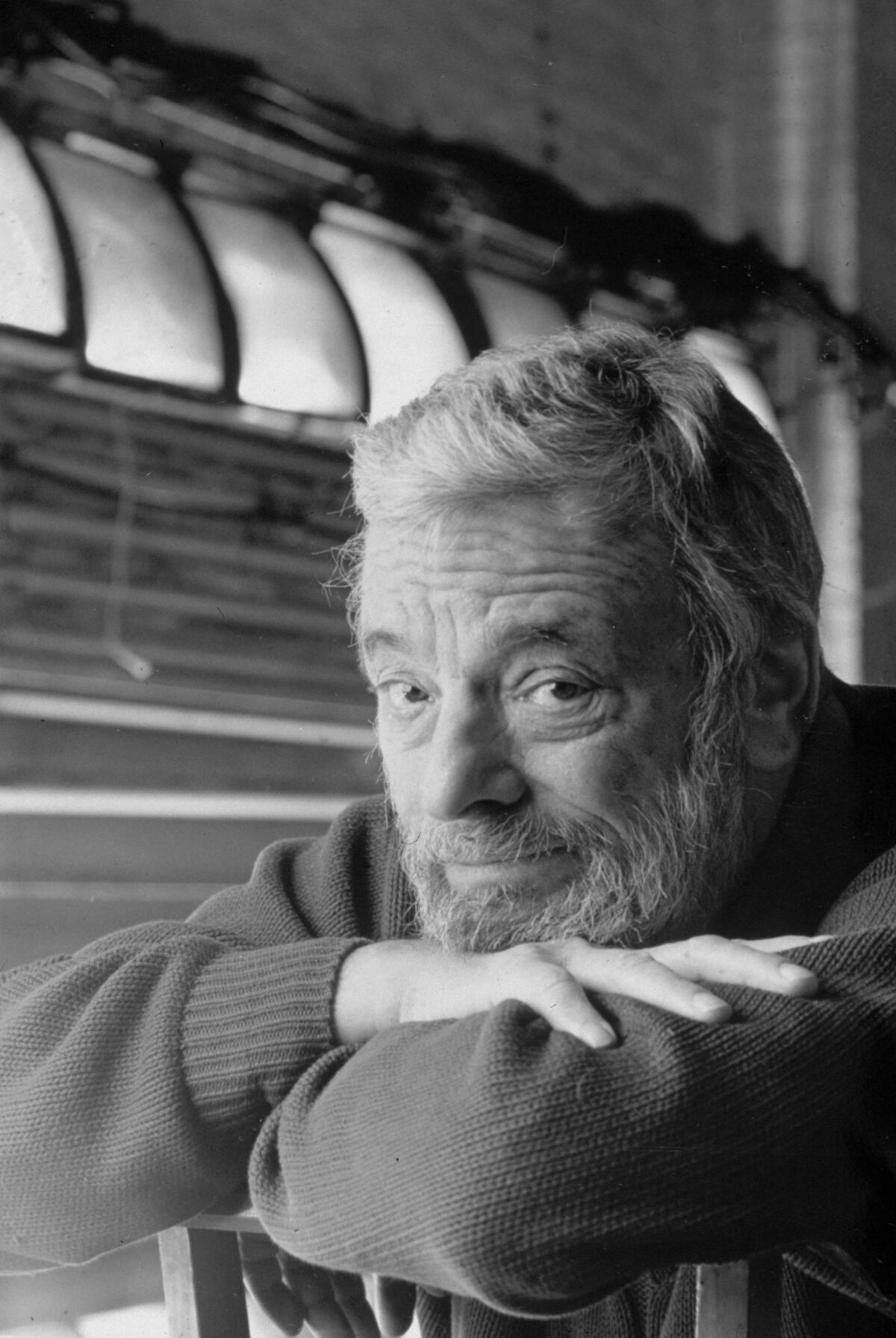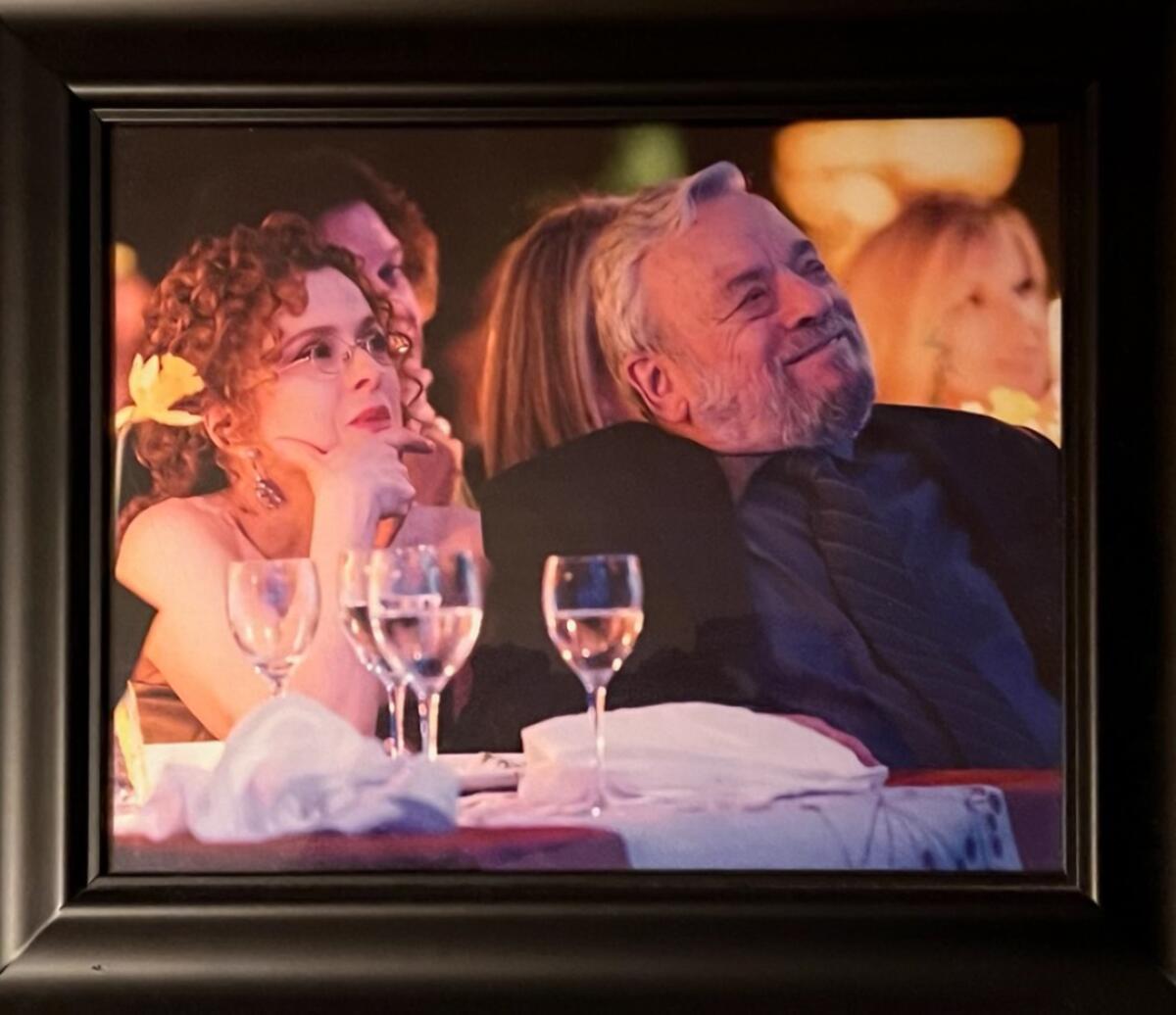Five collaborators on the challenge and thrill of working with Stephen Sondheim

Stephen Sondheim, who died Friday at 91, turned out score after score of music and lyrics for such landmark musicals as “Into the Woods,” “Assassins,” “Company,” “Follies” and “Sunday in the Park With George.”
I once asked Sondheim what the magic moment was for him in writing all those shows. “Those moments are few and far between,” he replied. “Sometimes, you get an idea and it works out, and that’s fine, but mostly it’s just slogging. I guess the fun is when you have made a song that you like and then play it for your collaborator.”
Sondheim called theater a collaborative effort, and so do his collaborators. Here is how several of them remember working with him.
John Weidman, playwright, “Assassins” librettist
My collaboration with Steve Sondheim on the show which became “Assassins” started in the best possible way. I had come to him with an idea for an entirely different show — a musical about the Paris Peace Conference in 1919. We talked it back and forth a bit, but Steve thought it felt more like a movie than a musical. And then he said, “What about this? Assassins?”
“Say some more,” I said — because at that point all he’d said was that one word.
Steve explained that several years earlier he had read a musical by a young playwright named Charlie Gilbert, about a Vietnam vet who is drawn into a shadowy conspiracy to assassinate the president. Decorating the show were cameo appearances by assassins from American history, and it was that collection of characters that had captured Steve’s imagination.
Why? He wasn’t entirely sure. I was intrigued. Why? I also wasn’t entirely sure. Later, I would come to understand as we worked that I was trying to make sense of the shock and anguish which I had experienced as a child in response to the bewildering and, to me, inexplicable assassination of John F. Kennedy.
The point is that Steve and I began, in the most fundamental and liberating way, to explore an as-yet-nonexistent idea. We had begun to collaborate. Not on how a particular song would grow out of a particular scene. Or on how a particular scene was actually the wrong scene and needed to be replaced by another.
With no preconceived notions, without an agenda, we simply started talking, letting the talk take us where it would. What were we looking for? We were looking for the show. If we found it, we’d write it. If we didn’t, we’d write something else.
This fundamental, blank-page collaboration with Steve, the collaboration which preceded the moment where either of us put pen to paper, was the best part of creating the show. It was challenging. It was exhilarating. I remember the thrill of it as if it were yesterday.
Marianne Elliott, director of Broadway’s “Company”
Stephen Sondheim was really keen that theater be seen as a serious art form with something to say. He took every suggestion very seriously. Everything was gone over, including every single line and even some melodies. We were changing the gender of our main character for this production, and he was very hands-on and very much a creator of this new version. He didn’t need to do that. He was in his late 80s then, and he was very successful. But he wanted to bring “Company” to new audiences and collaborated in a very open way about how that would be done.
Susan Stroman, choreographer and director, “The Frogs”
I worked closely with him in the ’90s on “A Little Night Music” for New York City Opera in 1990 and on “Sondheim: A Celebration at Carnegie Hall” in 1992, but our deepest collaboration was in 2004 when I directed and choreographed “The Frogs” by Aristophanes at Lincoln Center Theater. What resonated the most then was Sondheim saying to me that art can make a difference. I know that idea is evident in the lyrics of many of his shows but never so magnified as it was in “The Frogs.”
“The Frogs,” which was “freely adapted” by Burt Shevelove, then “even more freely adapted” by Nathan Lane, celebrates the spoken word and the idea that words have power and consequences. Dionysus goes to the underworld to bring back [George Bernard] Shaw and Shakespeare to have a verbal sparring match, and in the end Shakespeare wins because he is the poet. I always viewed Sondheim as a poet, even more than a lyricist or composer. He was unmatched in his formation of phrase and rhyme, and he gathered words to make people think.
Paul Gemignani, conductor and musical director
With other composers, you don’t always feel the freedom of saying, “Why don’t you change that chord?” He’d try it and sometimes say, “No, that doesn’t work.” It was like more than one person building a cabinet. He never treated you like, “I’m the composer, and you’re simply the conductor.” That doesn’t mean he wasn’t strong in his beliefs. But because he was so open creatively, he was never dismissive.
He would completely immerse himself in the project instead of in himself. If he particularly liked the scene that James Lapine or someone else wrote, he’d cut down the music so there would be more of the scene. And sometimes he would actually say, “That scene doesn’t need a song. It’s just perfect.” And he would say it in front of us all, not behind closed doors.

Bernadette Peters, singer and actress
If you asked, “What if I take a pause right here?” Steve would think about it for a moment. He’d say, “Let’s see. This is happening here, that is happening there.” He’d consider it and come to a conclusion, but of course, he’d already considered it. He was very open to suggestion, but I didn’t have many because I had such reverence for what he wrote.
We lost our Mozart. We lost our Beethoven. I lost my friend, and this world has lost this great talent who brought human experience to us in an entertaining way. I am so drawn to his music that basically, in my concerts, that’s mostly what I sing. I like being reminded that “No one is alone,” and “Children will listen,” and they’re wonderful ideas and thoughts for the audience to hear and think about.
More to Read
The biggest entertainment stories
Get our big stories about Hollywood, film, television, music, arts, culture and more right in your inbox as soon as they publish.
You may occasionally receive promotional content from the Los Angeles Times.










